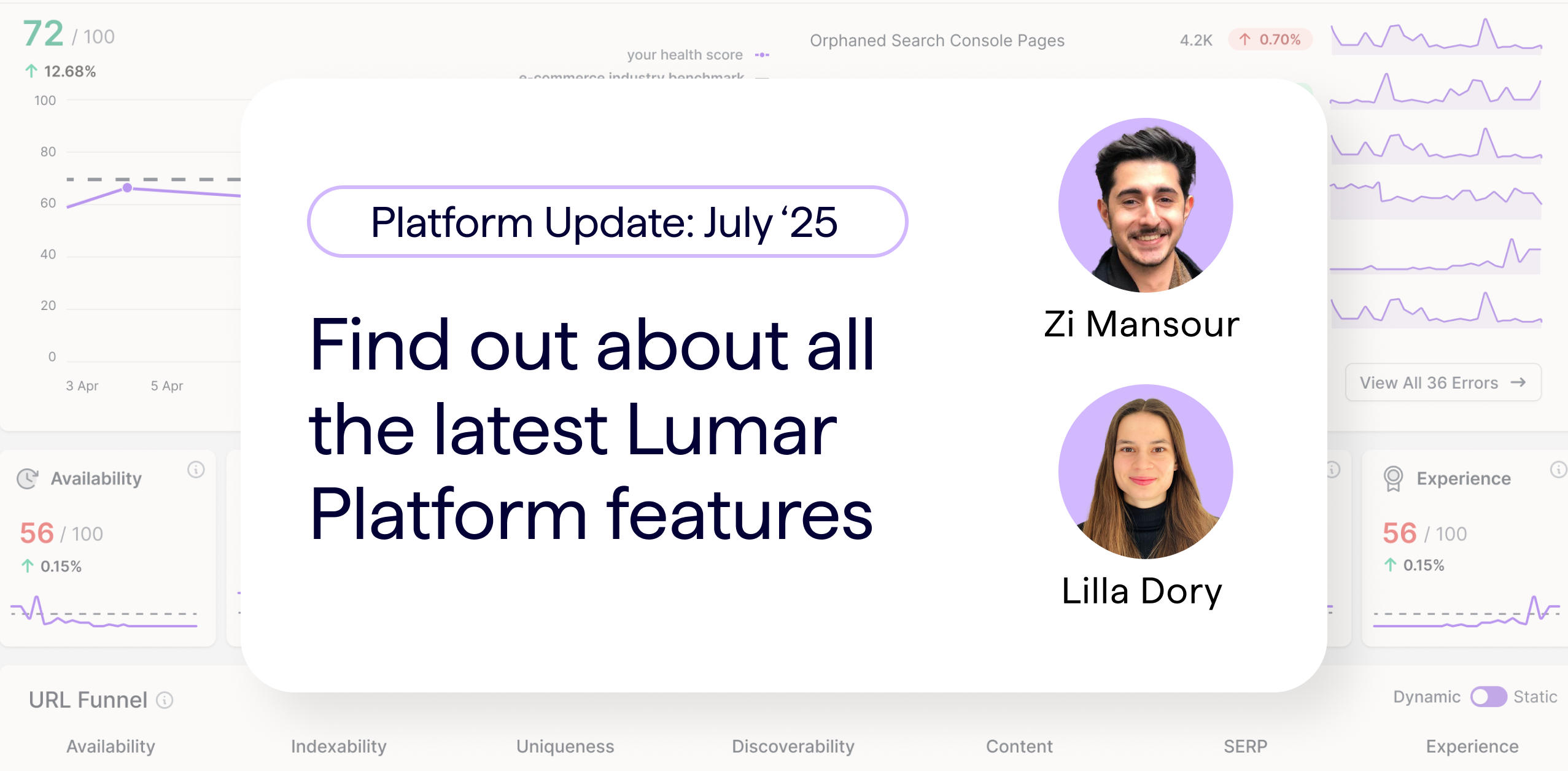Our first webinar of 2023 provided a deep-dive into SEO best practices for the fintech, banking, and financial services industry.
Lumar welcomed Ben Beckwith, Director of SEO at GoHenry, a company that provides debit cards for kids and a financial learning app, to discuss the ins and outs of finance-sector SEO.
In this session, Ben talks us through the unique website optimization challenges he deals with on a daily basis — from competing with well-known banking brands in Google to persuading stakeholders to invest in organic search — and guides us through the solutions and strategies he uses to maintain visibility for his brand in the SERPs.
Watch the full webinar above (including Q&A session) or read on for some key takeaways.
Unique considerations for fintech & financial services websites
For Beckwith, SEO in the financial services industry requires a content-centric approach.
He points to the strict quality guidelines in place from Google’s standpoint, owing to the fact it is a YMYL (“Your Money or Your Life”) sector — meaning finance-related websites generally provide information, services, or products that can influence decisions relating to someone’s money, wellbeing, or their life.
This means it is particularly important for the content that finance brands produce to be useful, truthful, and backed up by experts.
He also highlights the importance of adhering to EEAT: Experience, Expertise, Authoritativeness, and Trustworthiness guidelines when producing website content in the finance sector.
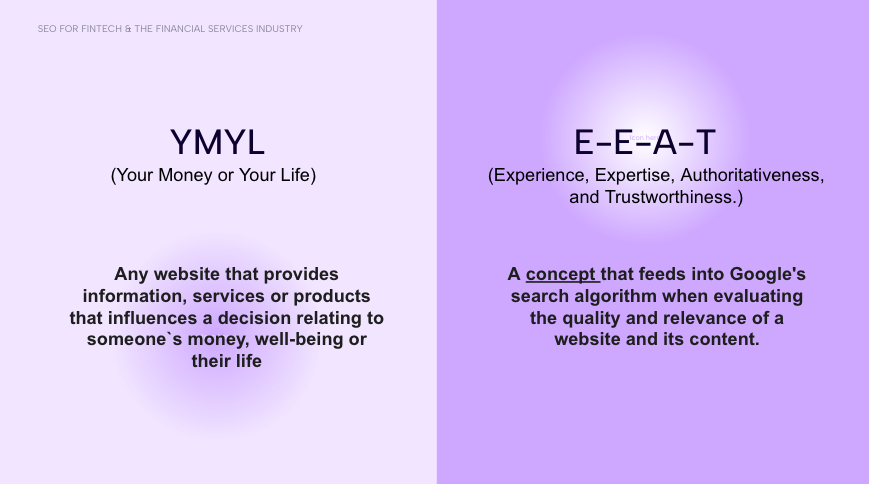
Furthermore, when it comes to optimization, finance-sector websites need to consider:
- Content on finance brand sites: Typically, finance sector websites will require granular content strategies at the URL-level
- Often ‘smaller’ websites: Smaller sites often don’t have the luxury of template-level optimizations
- Government regulations: Finance brands are often subject to additional government and legal requirements
- Trust: Earning consumer trust is essential — and demonstrating trustworthiness in your site’s content can be essential to ranking well in a YMYL sector.
- Competitive landscape: With fintech on the rise, new brands’ sites are regularly appearing in the SERPs as new competitors.
- Indirect competitors: SERP competition is likely to include indirect competitors, like the wide array of financial and business news sites.
- Highly complex topics: Many financial subjects are highly complex and need to be effectively broken down into simple concepts and language by subject matter experts.
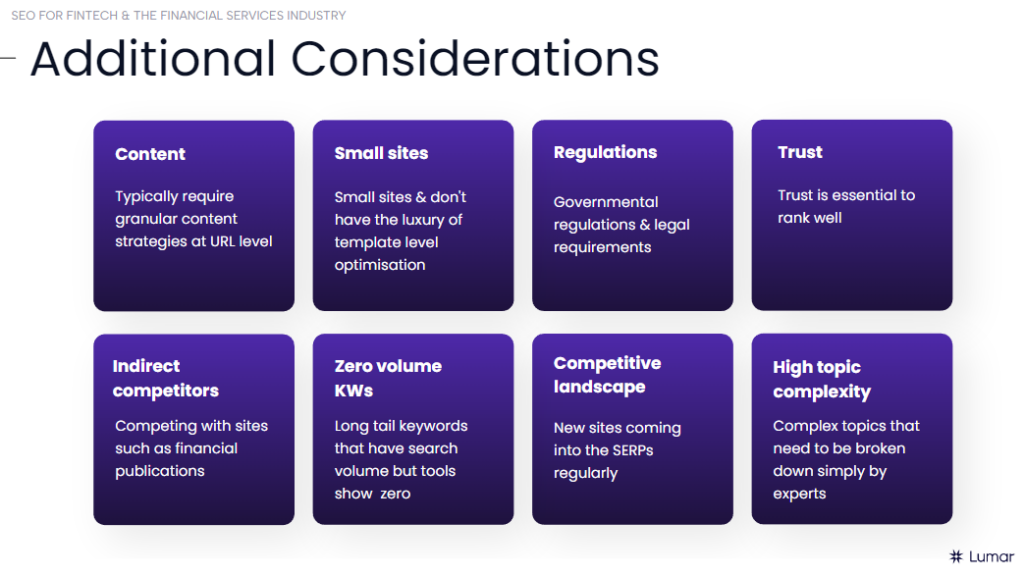
Why finance-related businesses are investing in SEO — and common website pitfalls
Beckwith highlights five key reasons fintech, banking, and financial services businesses are investing in organic search:
- Companies have an over-reliance on paid acquisition and need to diversify their marketing channels and customer acquisition strategies.
- Organic channels can provide a more cost-effective option in the future.
- SEO can benefit other marketing channels such as paid media.
- It helps improve the overall visibility of your brand.
- It opens your website up to new audiences.
But when it comes to embarking on organic search campaigns, he notes a number of mistakes brands and marketers might make along the way:
- Only producing brand-led content or thought leadership articles.
- Producing content on topics that sites are not an expert in.
- Content strategies that are too narrow resulting in minimal traffic.
- Overreliance on a small number of pages.
- Not owning informational questions related to the brand.
- Producing multiple articles on the same topic, causing ‘cannibalization’.
- Producing content that does not meet the users’ search intent.
- Not having an optimal technical SEO setup in place.
- Producing content for vanity metrics.
- Product pages that are optimized for product names.
- Not building out feature-related pages and solution pages.
Recommended approaches for financial services websites
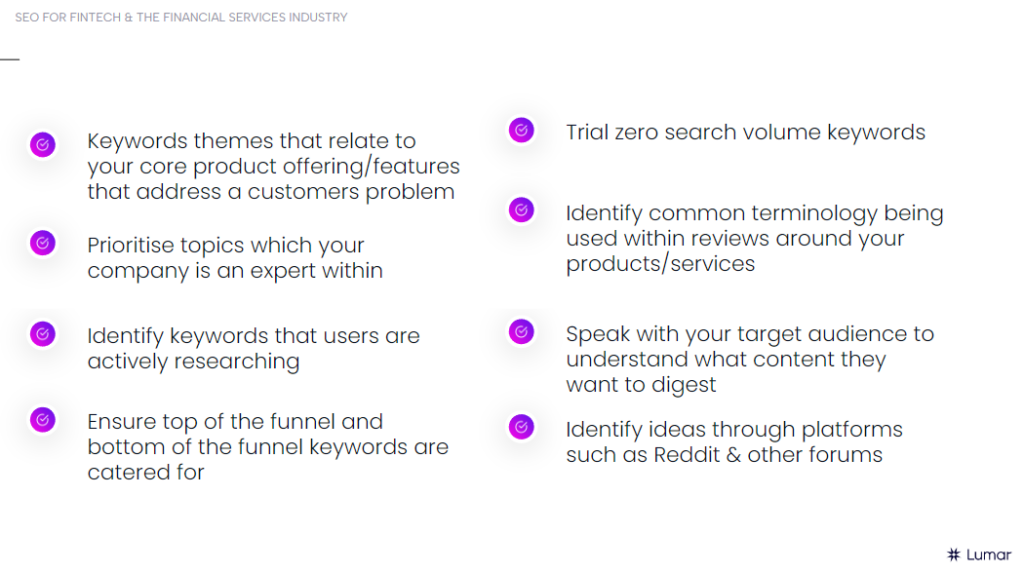
“Before you start, it’s important to identify who your audience is and work back from there,” Beckwith says.
Using GoHenry’s services as an example, their products are aimed at children and young people, but their content needs to be targeting their parents rather than the end user themselves.
“After identifying keywords, review your SERP competitors before finalizing your research,” Beckwith says. “This will help show how competitive the SERP is, who is ranking, direct or non-direct competitors, and how authoritative are those sites.”
How competitive are these SERPs? How authoritative are those domains? Beckwith points to the fact that marketers may want to de-prioritize certain keywords if the SERPs are already dominated by authoritative market leaders – and go for something more long-tail instead.
This strategy is helpful, too, even if you are a mature brand. After all, it helps to see who you are up against.
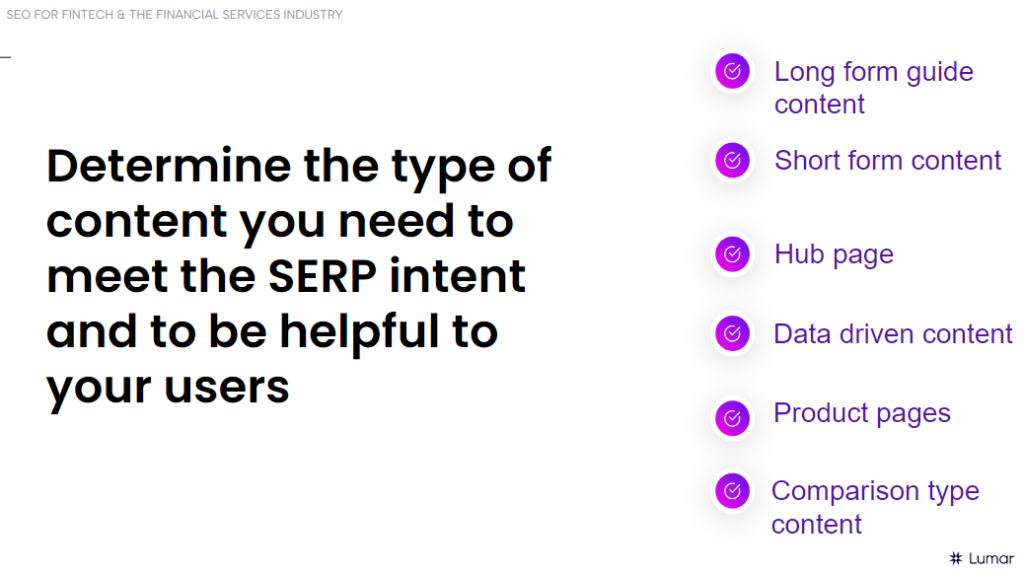
“Once we’ve figured out the keywords to go after and the kind of templates required we then move on to content curation,” Beckwith says. “So we need to focus on page quality by producing credible, authoritative and trusted content.”
Here it is important to remember Google’s Quality Rater Guidelines: “For most pages, the quality of the MC can be determined by the amount of effort, originality, and talent or skill that went into the creation of the content.” (Note: “MC” here refers to a page’s “main content.”)
Beckwith reiterates that your website’s reputation and content creators’ reputations also contributes to overall page quality. And this really important in the financial services industry.
Is the author an expert on the topic? Do they have a good reputation online? If not, is your brand well-known for giving quality advice on the topic in question? Is your brand/author alone enough, or does your article need to include additional industry experts?
Beckwith suggests carrying out an expert audit. This involves looking at the top three results for a keyword and asking: Who’s written the content? Are they experts? Are they being used to back up the authority of the domain/brand? Are there quotes from different professionals? Are these quotes/perspectives market-specific?
Beckwith reminds financial industry search professionals that their site’s content needs to be factual and up-to-date.
Claims need to be backed up with credible sources in order to reinforce trust. Primary research data and case studies are important here too and can help provide originality – which Google loves.
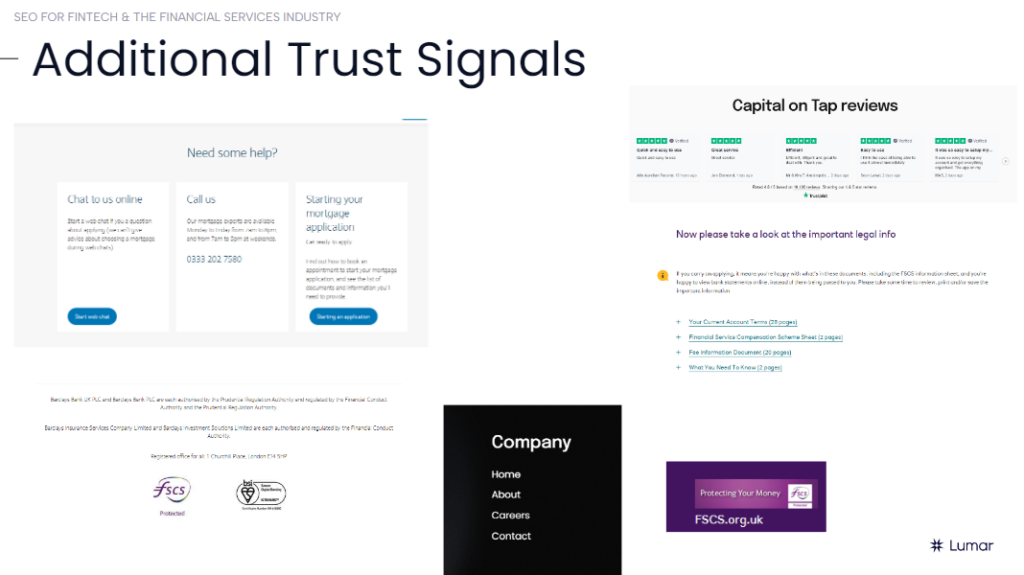
Technical SEO considerations for your content
According to Beckwith, even if your website is small, technical SEO should not be forgotten.
Pages should be internally linked and clustered by topic to tie them together and help search engines understand content structure and the authority your site has about certain topics.
Having a solid, easy-to-use, CMS is helpful as well. A lot of content in the finance sector is time-sensitive, so it is important to be able to upload articles and updates immediately. If your article headline or title tag includes a date or yea, it’s worth leaving the date off of the URL itself so it can be more evergreen and used again for updated versions of that content.
A good CMS should also have a scheduling functionality, the option to delete and redirect content easily, and hreflang integration if your site is available in multiple languages and locations. The latter is particularly useful for market-specific content, as it helps Google identify content to rank for different countries.
Other technical considerations include ensuring Javascript can be crawled, providing clear crawl paths to ensure older content can be rediscovered, and using schema markup / structured data to earn rich results in the SERPs.
Off-page SEO strategies
Beckwith also points to off-page strategies (i.e., earning backlinks to your site) to help boost your search rankings, brand awareness, and topical authority.
He advises building helpful, user-friendly tools on your website that become linkable assets. Mortgage and savings calculators, for example, are not only useful to users but also build trust and authority.
Reports, studies, and indexes can provide the same function. Experts from your brand can then offer quotes, research, and viewpoints for news articles.
SEO reporting and forecasting
When it comes to reporting on your SEO efforts, Beckwith splits KPIs into primary and secondary categories. The primary KPIs are higher-level and tie in more directly with larger business goals, while the secondary SEO KPIs are more granular and perhaps more of interest to specialist teams.
3 primary SEO KPIs:
- Organic traffic
- Conversions / leads
- Revenue
3 secondary SEO KPIs:
- Rankings
- Backlinks
- Engagement metrics
He highlights that, in SEO reporting:
- Everything needs to be tied back to your primary KPIs.
- Ensure you have clear visibility on the number of conversions within your reporting.
- Tag your content by theme/category.
- Tag your URLs by page template (blog, comparison, product etc.).
- Extract published/updated page date and bring into your reporting.
- Break out traffic by brand and non-brand.
- Track the distribution of traffic by URLs.
- Keep a log of on-page and technical optimizations.
12 key takeaways for SEO content strategies in the finance sector
- Make sure market research aids your SEO strategy.
- Content needs to meet the SERP intent and be helpful.
- Prioritize keywords where you are the topic expert.
- Ensure your author or brand is seen as the expert.
- Use external/internal experts to help with credibility.
- Use data and third-party sources to back up claims.
- Build up your brand’s trust/authority as well as your internal experts.
- Create content clusters around specific topics.
- Have good relationships with all internal stakeholders.
- Ensure a granular reporting infrastructure is in place.
- Don’t forget that technical SEO is still important.
- Tie everything back to revenue.
Additional resources

2023 SEO Strategy Guide: Trends to Watch This Year
In this in-depth guide, we cover some of the top trends in SEO to watch in this year.





